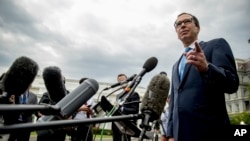U.S. Treasury Secretary Steven Mnuchin said Monday he sees no threat of a U.S. recession, even as several indicators appear to be signaling that the world's largest economy is slowing.
Job growth in the U.S. slowed to 130,000 in August, well below the 223,000 average monthly gain in 2018. The U.S. economy advanced at a yearly rate of 2% in the April-to-June period, down from the 3.1% expansion in the first three months of the year.
The data, along with falling business investment and ongoing trade disputes with China and Europe, have fueled talk of a U.S. economic downturn. But Mnuchin told Fox News, "I don't see in any way a recession."
He said, "There's no question there's been a considerable slowdown in the world economy both in China and in Europe. But as you look at the U.S., we continued to be the bright spot. We have not seen any impact on the U.S. economy." he added.
While U.S. President Donald Trump and Chinese President Xi Jinping have engaged in a tit-for-tat tariff war on hundreds of billions of dollars of exports heading to each others' shores, Mnuchin held out hope of progress in reaching a trade deal with Beijing when the two sides resume trade talks in the coming weeks in Washington.
"They're coming here. I take that as a sign of good faith that they want to continue to negotiate," Mnuchin said. "And we're prepared to negotiate. If we can get a good deal, a deal that's good for us, we'll sign it. If not, the president is perfectly fine with continuing the tariffs."
He said the two countries have a "conceptual agreement" on how to enforce the terms of any deal.
But contentious issues remain. The U.S. is seeking changes in how China protects intellectual property, an end to the forced transfer of U.S. technology to Chinese companies and a reduction in China's annual trade surplus with the U.S. in which it sells hundreds of billions of dollars more of goods to the U.S. than it buys from American companies.





